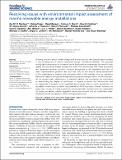Files in this item
Resolving issues with environmental impact assessment of marine renewable energy installations
Item metadata
| dc.contributor.author | Maclean, Ilya M. D. | |
| dc.contributor.author | Inger, Richard | |
| dc.contributor.author | Benson, David | |
| dc.contributor.author | Booth, Cormac G. | |
| dc.contributor.author | Embling, Clare B. | |
| dc.contributor.author | Grecian, W. James | |
| dc.contributor.author | Heymans, Johanna J. | |
| dc.contributor.author | Plummer, Kate E. | |
| dc.contributor.author | Shackshaft, Michael | |
| dc.contributor.author | Sparling, Carol E. | |
| dc.contributor.author | Wilson, Ben | |
| dc.contributor.author | Wright, Lucy J. | |
| dc.contributor.author | Bradbury, Gareth | |
| dc.contributor.author | Christen, Nadja | |
| dc.contributor.author | Godley, Brendan J. | |
| dc.contributor.author | Jackson, Angus C. | |
| dc.contributor.author | McCluskie, Aly | |
| dc.contributor.author | Nicholls-Lee, Rachel | |
| dc.contributor.author | Bearhop, Stuart | |
| dc.date.accessioned | 2017-05-15T14:30:14Z | |
| dc.date.available | 2017-05-15T14:30:14Z | |
| dc.date.issued | 2014-12-16 | |
| dc.identifier | 249954716 | |
| dc.identifier | dcc0d147-a3ad-4f6c-a43f-e2d357fcab11 | |
| dc.identifier | 85008645135 | |
| dc.identifier | 000485310600071 | |
| dc.identifier.citation | Maclean , I M D , Inger , R , Benson , D , Booth , C G , Embling , C B , Grecian , W J , Heymans , J J , Plummer , K E , Shackshaft , M , Sparling , C E , Wilson , B , Wright , L J , Bradbury , G , Christen , N , Godley , B J , Jackson , A C , McCluskie , A , Nicholls-Lee , R & Bearhop , S 2014 , ' Resolving issues with environmental impact assessment of marine renewable energy installations ' , Frontiers in Marine Science , vol. 1 , 75 . https://doi.org/10.3389/fmars.2014.00075 | en |
| dc.identifier.issn | 2296-7745 | |
| dc.identifier.other | ORCID: /0000-0002-6428-719X/work/32706781 | |
| dc.identifier.other | ORCID: /0000-0001-7658-5111/work/89178109 | |
| dc.identifier.uri | https://hdl.handle.net/10023/10776 | |
| dc.description.abstract | Growing concerns about climate change and energy security have fueled a rapid increase in the development of marine renewable energy installations (MREIs). The potential ecological consequences of increased use of these devices emphasizes the need for high quality environmental impact assessment (EIA). We demonstrate that these processes are hampered severely, primarily because ambiguities in the legislation and lack of clear implementation guidance are such that they do not ensure robust assessment of the significance of impacts and cumulative effects. We highlight why the regulatory framework leads to conceptual ambiguities and propose changes which, for the most part, do not require major adjustments to standard practice. We emphasize the importance of determining the degree of confidence in impacts to permit the likelihood as well as magnitude of impacts to be quantified and propose ways in which assessment of population-level impacts could be incorporated into the EIA process. Overall, however, we argue that, instead of trying to ascertain which particular developments are responsible for tipping an already heavily degraded marine environment into an undesirable state, emphasis should be placed on better strategic assessment. | |
| dc.format.extent | 5 | |
| dc.format.extent | 319626 | |
| dc.language.iso | eng | |
| dc.relation.ispartof | Frontiers in Marine Science | en |
| dc.subject | Ecological impact assessment | en |
| dc.subject | Environmental impacts | en |
| dc.subject | Marine biodiversity | en |
| dc.subject | Marine protected areas | en |
| dc.subject | Offshore wind | en |
| dc.subject | United Kingdom | en |
| dc.subject | Wind farm | en |
| dc.subject | Wind power | en |
| dc.subject | QH301 Biology | en |
| dc.subject | GC Oceanography | en |
| dc.subject | Oceanography | en |
| dc.subject | Global and Planetary Change | en |
| dc.subject | Water Science and Technology | en |
| dc.subject | Ocean Engineering | en |
| dc.subject | Aquatic Science | en |
| dc.subject | SDG 7 - Affordable and Clean Energy | en |
| dc.subject | SDG 13 - Climate Action | en |
| dc.subject | SDG 14 - Life Below Water | en |
| dc.subject.lcc | QH301 | en |
| dc.subject.lcc | GC | en |
| dc.title | Resolving issues with environmental impact assessment of marine renewable energy installations | en |
| dc.type | Journal article | en |
| dc.contributor.institution | University of St Andrews. SMRU Consulting | en |
| dc.contributor.institution | University of St Andrews. School of Biology | en |
| dc.contributor.institution | University of St Andrews. Sea Mammal Research Unit | en |
| dc.contributor.institution | University of St Andrews. Scottish Oceans Institute | en |
| dc.identifier.doi | https://doi.org/10.3389/fmars.2014.00075 | |
| dc.description.status | Peer reviewed | en |
This item appears in the following Collection(s)
Items in the St Andrews Research Repository are protected by copyright, with all rights reserved, unless otherwise indicated.

